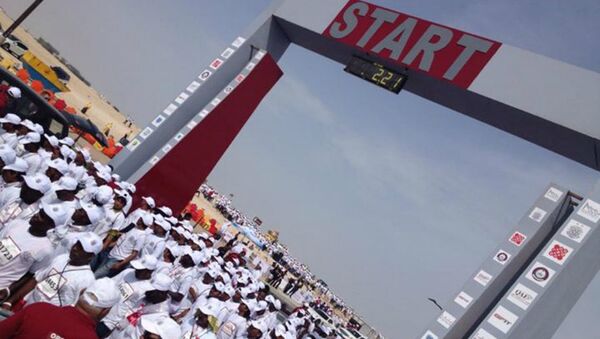The Qatar Mega Marathon, organized by Al Sadd Sports Club, was an attempt to set a Guinness World Record by having 50,000 participants run at once. Despite the race being postponed past its original date of Feb. 6 (Qatar's National Sports Day), high estimates are that they mustered only 33,000 runners with other observers putting the figures much lower.
Worst PR Stunt Ever?
Observers say approximately one laborer a day is dying during the preparations for the country to host the 2022 World Cup. The proceedings have been plagued by reports of atrocious, overcrowded, unsanitary living and working conditions for the mainly South Asian immigrant laborers.
"Workers typically pay exorbitant recruitment fees and employers regularly take control of their passports when they arrive in Qatar," which effectively renders them slaves, unable to change jobs or escape, explains Human Rights Watch.
An estimated 4,000 workers will die building the World Cup facilities, the International Trade Union Confederation (ITUC) told the Guardian.
— Doha Qatar News (@DohaQatarNews) March 27, 2015
And this race was, incredibly, an effort to combat this bad press.
"Mega Marathon Qatar represents a decisive response to the campaign waged by the sector of envious haters on the success of Qatar to host the 2022 FIFA World Cup, and to their false allegations of persecution of workers and residents in our beloved country," reads the race's official website.
Clearly, the public relations effort did not go as planned.
The marathon was "one of the most disorganized and chaotic events I have ever had the displeasure of attending," an observer told the Doha News.
— Maxi Rodriguez (@FutbolIntellect) December 17, 2013
Besides suffering from organizational and logistical hurdles like poorly coordinated transportation, a lack of refreshments and equipment, and a late start in the middle of the day in the desert, some of the participants were clearly there against their will.
"The worst part of all was that there was a large mass of laborers wearing jeans, flip flops and no proper running equipment… Some laborers tried to leave but were turned back and were yelled at that they need to stay and cross the line," another participant told Doha News.
Corruption and Climate Concerns
In addition to the horrific reports of workers' conditions, the Qatar 2022 World Cup has been plagued with allegations of bribery and corruption, and observations that hosting a sporting event in the summer in a dessert was a questionable undertaking to begin with.
After a task force was convened to study concerns about summer heat, FIFA officials confirmed in March 2015 that the World Cup would begin December 18 2022, just a week before Christmas.
— Vancouver Owls (@Vancouverowls) March 20, 2015
In 2010, it was announced that Qatar would host FIFA World Cup 2022. The announcement was followed by accusations that the FIFA vice-president at the time, Jack Warner, was allegedly paid $1.2 million by a company controlled by a retired Qatari football official after Qatar won the bid for 2022. However, FIFA President Joseph Blatter said later there were no legal grounds to revoke the result of the 2022 bid.
— WrongSideOfThePond (@wrongsideofpond) April 3, 2015
Later investigations have raised serious concerns about FIFA's integrity and many have called not only for revocation of Qatar's World Cup but for a wholesale revamp of football's organizing body.
Qatar has been on a PR offensive on all fronts, even hiring a western PR firm to spin coverage of corruption and slavery scandals.
Under international pressure, the government had promised to address concerns over working conditions, but in 2014 Amnesty International found that the government had not followed through.
"It has been four years since Qatar won the bid to host the World Cup, putting itself in the global spotlight, so far its response to migrant labor abuses has not been much more than promises of action and draft laws," the organization's head of refugee and migrant rights Sherif Elsayed-Ali said.
According to Systainalytics, migrants account for 94% of Qatar's total workforce, with workers coming mainly from India, Pakistan, Sri Lanka, the Philippines, Nepal and Bangladesh.




